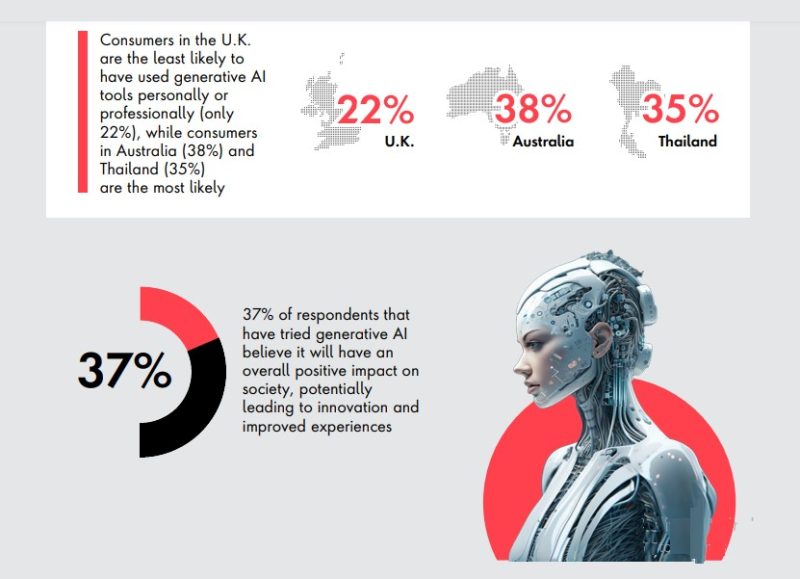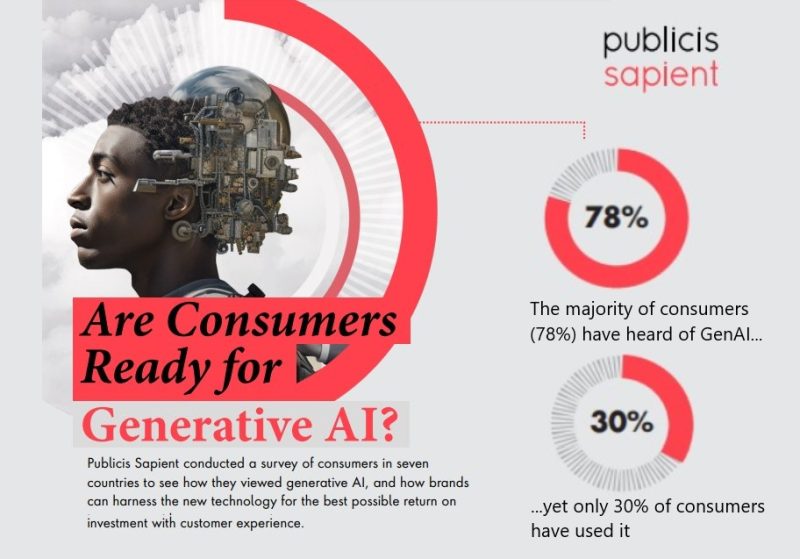Today, Thailand is experiencing a digital revolution that is reshaping consumer lifestyles in unprecedented ways, with the adoption of innovative technologies particularly in the realm of artificial intelligence (AI). From voice assistants to facial recognition platforms, Generative AI (GenAI) which was once considered ground-breaking is now making significant inroads into consumers’ day to day.
Publicis Sapient’s latest edition of Guide to Next – its annual outlook on digital business transformation trends – includes a Generative AI Report, which is based on a survey of more than 10,000 consumers across the U.S., the U.K., Australia, France, Denmark, Germany, and Thailand. The survey reveals that most consumers (78%) have heard of GenAI while only 30% have used it. However, amongst the 2061 Thai respondents surveyed, more than one in three consumers (35%) have used GenAI tools personally or professionally, showing that Thai consumers are leading the global market in terms of GenAI usage alongside Australian consumers (38%).
Andrew Male, Client Partner, ASEAN says, “We are extremely excited at the potential that generative AI brings when it comes to transforming the customer experience. Thailand has shown itself to be a leader in embracing the use of generative AI tools, and we look forward to collaborating with our partners and customers to harness these innovative technologies and continually develop innovative solutions that transform how we live, work, and play.”
From the survey, we gleaned the following insights on expectations from organizations towards harnessing the GenAI experience:
Customers expect Generative AI to enhance their experiences
Almost half of GenAI users (43%) want brands to use the technology to improve overall customer experience. This expectation is mirrored amongst Thai consumers in general, with more than 1 in 2 (55%) expecting GenAI to improve their overall customer experiences, when interacting with brands and or its products and services.
Organizations can develop three strategies that will help harness GenAI for customers, according to the survey. Firstly, focus on product research and discovery to enable faster and more accurate search results, a primary concern for all GenAI experts and novices. Next, focus on helping consumers find the best deals amidst rising costs of living and inflation. And lastly, invest in GenAI -powered customer services to enable seamless, automated interactions like product returns and exchanges.
Personalized, retail experiences to power growth
While GenAI can be deployed to elevate a wide range of customer experiences, retail applications stand to have the most impact. Amongst global consumers who have used GenAI, a vast majority of Thai consumers (97%) are excited about what it will bring to their shopping experience.
For Thailand, a country with more GenAI users on average, the potential impact is even larger, with 86% of all GenAI users in Thailand (versus the global average of 63%) reporting that its impact on shopping experiences excites them. Organizations can consider implementing a conversational chat assistant – a popular emerging use case for GenAI – with nearly half of GenAI users globally (45%) extremely or very likely to use a conversational application of the technology for travel and hospitality shopping. In contrast, a whopping 63% of GenAI users in Thailand are very likely to do so as well.
Unprecedented, ethical implications remain top of mind
In addition to prevailing concerns around GenAI’s impact on job security in the near future, a large majority of consumers remain apprehensive of the content produced by GenAI and the safety of using the tools, with only 21% trusting the outputs of GenAI tools.
Though Thai consumers reportedly are more trusting of trust GenAI’s content and outputs (44%) and consider them safe to use (42%), organizations must continue to ensure ethical implementation to establish deeper trust for longer term customer retention. Strategies include investing in development of guardrails for large language models (LLMs) to promote accurate responses; securing private consumer and/or client data usually revealed with chatbots and conversational searches; and establishing a foundation of transparency based on clear communication of data sources.
Customers today are more than ready for better experiences with the integration of GenAI, and brands that go the extra mile to have a clear understanding of their views on this technology can reap the benefits of investing in enhancing customer experiences.
Learn more about consumer attitudes to Generative AI at https://www.publicissapient.com/content/dam/guide-to-next/2024/pdf/GenAI-Infographic-PR.pdf

